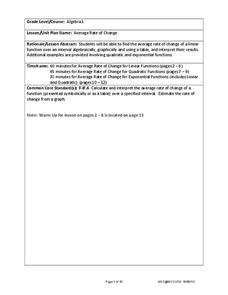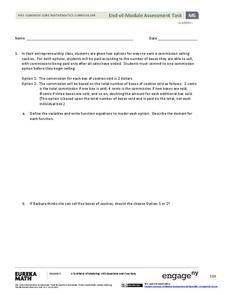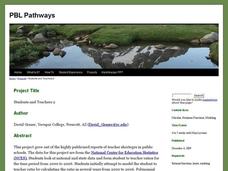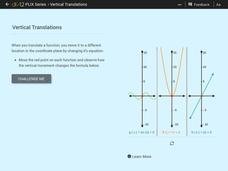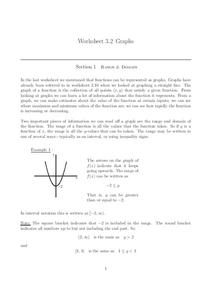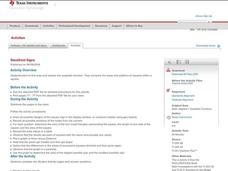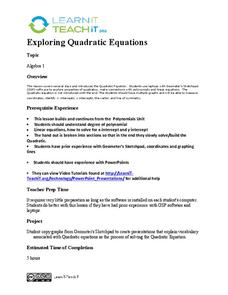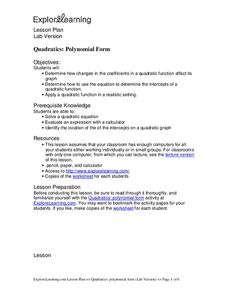EngageNY
Analyzing a Data Set
Through discussions and journaling, classmates determine methods to associate types of functions with data presented in a table. Small groups then work with examples and exercises to refine their methods and find functions that work to...
Rice University
Intermediate Algebra
Algebra concepts are all wrapped up in one nice bow. The resource combines all the concepts typically found in Algebra I and Algebra II courses in one eBook. The topics covered begin with solving linear equations and move to linear...
EngageNY
Relationships Between Quantities and Reasoning with Equations and Their Graphs
Graphing all kinds of situations in one and two variables is the focus of this detailed unit of daily lessons, teaching notes, and assessments. Learners start with piece-wise functions and work their way through setting up and solving...
Balanced Assessment
Local and Global Behavior
Create rules for numerical sequences. Pupils develop local rules and recursive rules for number sequences. The sequences are linear, quadratic, and cubic in nature. Scholars find that some local rules do not work, no matter where in the...
Virginia Department of Education
Curve of Best Fit
Which function models the data best? Pupils work through several activities to model data with a variety of functions. Individuals begin by reviewing the shapes of the functions and finding functions that will fit plotted data points. By...
West Contra Costa Unified School District
Average Rate of Change
Learners investigate average rates of change for linear functions and connect the concept to slope. They then determine average rates of change in quadratic and exponential functions.
EngageNY
End-of-Module Assessment Task - Algebra 1 (Module 5)
This unit assessment covers the modeling process with linear, quadratic, exponential, and absolute value functions. The modeling is represented as verbal descriptions, tables, graphs, and algebraic expressions.
Balanced Assessment
Books from Andonov
To examine mathematical functions in a modeling situation pupils combine quadratic and step functions to represent a presented scenario. They both graph and write a function to represent data shown in a table.
PBL Pathways
Students and Teachers 2
Examine trends in student-to-teacher ratios over time. Building from the first task in the two-part series, classes now explore the pattern of student-to-teacher ratios using a non-linear function. After trying to connect the pattern to...
CK-12 Foundation
Vertical Translations
Change the y-intercept by adding a constant to the function. Individuals move three functions vertically along the y-axis. As they observe how the equation of the functions change with the vertical movement, learners determine how to...
CK-12 Foundation
Vertical Line Test: Exploration
What do vertical lines have to do with functions? Individuals slide a vertical line through four different graphs. They use that vertical line test to determine if the graphs represent functions.
CCSS Math Activities
Patchwork
Patch up any misconceptions about writing functions. Scholars undertake a performance task that has them first examine a pattern in patchwork cushions. They represent the patterns in triangular and rectangular blocks using a table and as...
Curated OER
Two Squares are Equal
This problem is sure to get your young mathematicians thinking. The idea sounds simple: one equation, solve it as many ways as you can. This is meant to get at a deeper understanding of solving quadratic equations, including some more...
Curated OER
Reflections of a Quadratic Function
Students are asked to explain the relationship between f(s) and f (-x). They are asked to determine how the equation of f(x) differs from the equation of f(-x). Students determine the conditions when f(x) is the same as f(-x). They graph...
Curated OER
Is There a Limit to Which Side You Can Take?
Calculus students find the limit of piecewise functions at a value. They find the limit of piecewise functions as x approaches a given value. They find the limit of linear, quadratic, exponential, and trigonometric piecewise functions.
Curated OER
Graphs
In this graphs worksheet, students solve and complete 15 various types of problems. First, they determine the range of the function of the graph shown and write in interval notation. Then, students find the domain of the function in the...
Curated OER
The Factor Connection
Pupils investigate the connection between factors, zeros, and graphs of quadratic functions. The instructional activity requires the TI-nspire handheld.
Curated OER
Storefront Signs
Learners practice finding the areas and patterns within a square and explore the concept of quadratic functions. They observe and record the area values in a table, plot a graph of Area versus Distance and complete a variety of student...
Curated OER
Exploring Quadratic Equations
Eleventh graders explore quadratic equations. For this Algebra II lesson, 11th graders use Geometer’s Sketchpad to explore the properties of quadratics and the connections with polynomials and linear equations. The lesson is designed...
Curated OER
Properties of Parabolas
Have your learners investigate parabolas. In this Algebra II lesson, students explore the basic definition of a parabola by using Cabri Jr. to create a parabola given the focus and directrix. Students interpret the equation for a...
Curated OER
Function Composition
High schoolers solve two functions at once. In this algebra lesson, students add, subtract, multiply and divide composition functions. They use the correct notation and substitution to get their answer.
Curated OER
Using Factoring to Solve Equations
Eleventh graders use factoring to solve 44 different problems involving area, intercepts, quadratic equations, and functions.
Radford University
“FUN-ctions” Find the Equation of a Scream
Take a function along for a ride. Given the graph of a roller coaster track, pupils determine key features of the graph such as the maximum, minimum, intervals of increase and decrease, and roots. They figure out the equation of the...
Curated OER
Quadratics: Polynomial Form
High schoolers determine how changes in the coefficients in a quadratic function affect its graph. They Solve a quadratic equations. Students Determine how to use the equation to determine the intercepts of a quadratic function. They...







